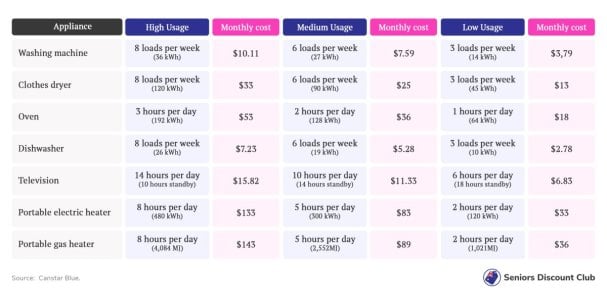Slash your energy bills by HUNDREDS a month this winter with these tips from experts
- Replies 36
Ah, winter. Usually a time of hot chocolate, fuzzy socks, and snuggling up near the fire. But with the cold weather comes something much less appealing: energy bills that can sometimes be the (frigid) bane of our existence.
As anyone who’s been around the block a few times will tell you, bills can often be a significant source of financial strain, especially when faced with rising costs of living.
So, to help you out this season, here is some advice on how to slash those energy bills by hundreds of dollars!
First up, don’t let your appliances do all the work! Thanks to research conducted by Canstar Blue, they’ve calculated that exchanging habits around your washing machines, ovens, dishwashers, etc., with conscious decision-making, can help you save quite a bit of money.

Let's start in the laundry, where the washing machine and dryer are two of the most frequently used appliances. Canstar Blue recommends reducing the number of loads per week from eight to three, as this could save you up to $6.32 per month on washing machine energy and up to $20 per month on clothes dryer energy.
That's already around $26.32 per month saved—sounds like a great deal, doesn't it?
Moving on to the kitchen, where the oven and dishwasher are hungry energy consumers. Instead of using the oven for three hours per day, Canstar Blue suggests cutting the use down to just one hour, potentially saving you up to $35 monthly.
This might be the perfect time to consider batch cooking your meals—not only does it save energy, but it can also help plan healthy meals.
As for the dishwasher, reducing the number of loads per week from eight to three could save you around $4.45. After all, if you're cooking less, you'll have fewer pots and pans to wash!
Now, let's turn our attention to the living room and the ever-looming TV use. Reducing TV usage from 14 hours per day to just 6 hours could put an extra $8.99 back into your pocket monthly. Maybe it's time to pick up that book you've been meaning to read or even take up a new hobby.
Last but not least, let's address the all-important heating issue during the winter months.
According to Canstar Blue, if you have a portable electric heater, cutting down its usage from 8 hours per day to 2 hours could save you a whopping $100 monthly! If you're a portable gas heater owner, reducing usage from 8 to 2 hours could save up to $107 monthly. That's a significant amount of savings right there.
Presented below are the findings from the Canstar Blue study, illustrating the potential savings achievable by an average four-person household monthly through the reduction of their everyday appliance use.

These tips should serve as a helpful reminder that taking small daily steps could save you a ton during these chilly months, allowing you to spend your money on the things that really matter—like spending quality time with loved ones or perhaps treating yourself to a little indulgence.
Have any of you tried these tips already? Or are they new information for you? If you have more tips on saving energy this winter season, please share them in the comments below! We'd love to hear from you! So stay warm, and let's all save together, members!
As anyone who’s been around the block a few times will tell you, bills can often be a significant source of financial strain, especially when faced with rising costs of living.
So, to help you out this season, here is some advice on how to slash those energy bills by hundreds of dollars!
First up, don’t let your appliances do all the work! Thanks to research conducted by Canstar Blue, they’ve calculated that exchanging habits around your washing machines, ovens, dishwashers, etc., with conscious decision-making, can help you save quite a bit of money.

By implementing a few simple changes to your daily habits at home, you can save yourself hundreds of dollars this winter. Credit: Shutterstock.
Let's start in the laundry, where the washing machine and dryer are two of the most frequently used appliances. Canstar Blue recommends reducing the number of loads per week from eight to three, as this could save you up to $6.32 per month on washing machine energy and up to $20 per month on clothes dryer energy.
That's already around $26.32 per month saved—sounds like a great deal, doesn't it?
Moving on to the kitchen, where the oven and dishwasher are hungry energy consumers. Instead of using the oven for three hours per day, Canstar Blue suggests cutting the use down to just one hour, potentially saving you up to $35 monthly.
This might be the perfect time to consider batch cooking your meals—not only does it save energy, but it can also help plan healthy meals.
As for the dishwasher, reducing the number of loads per week from eight to three could save you around $4.45. After all, if you're cooking less, you'll have fewer pots and pans to wash!
Now, let's turn our attention to the living room and the ever-looming TV use. Reducing TV usage from 14 hours per day to just 6 hours could put an extra $8.99 back into your pocket monthly. Maybe it's time to pick up that book you've been meaning to read or even take up a new hobby.
Last but not least, let's address the all-important heating issue during the winter months.
According to Canstar Blue, if you have a portable electric heater, cutting down its usage from 8 hours per day to 2 hours could save you a whopping $100 monthly! If you're a portable gas heater owner, reducing usage from 8 to 2 hours could save up to $107 monthly. That's a significant amount of savings right there.
Presented below are the findings from the Canstar Blue study, illustrating the potential savings achievable by an average four-person household monthly through the reduction of their everyday appliance use.
Key Takeaways
- Households can save up to $300 a month on energy bills this winter by making changes to how they use appliances.
- Some suggested changes include reducing the number of loads of laundry, cutting down on oven and dishwasher usage, watching less television, and limiting heater usage.
- Canstar Blue also encourages bulk cooking meals and picking up hobbies like reading as alternatives to using energy-consuming appliances and devices.
- Save on energy bills by sharing tips and strategies in the comments section for others to benefit from during the winter season.
These tips should serve as a helpful reminder that taking small daily steps could save you a ton during these chilly months, allowing you to spend your money on the things that really matter—like spending quality time with loved ones or perhaps treating yourself to a little indulgence.
Have any of you tried these tips already? Or are they new information for you? If you have more tips on saving energy this winter season, please share them in the comments below! We'd love to hear from you! So stay warm, and let's all save together, members!








